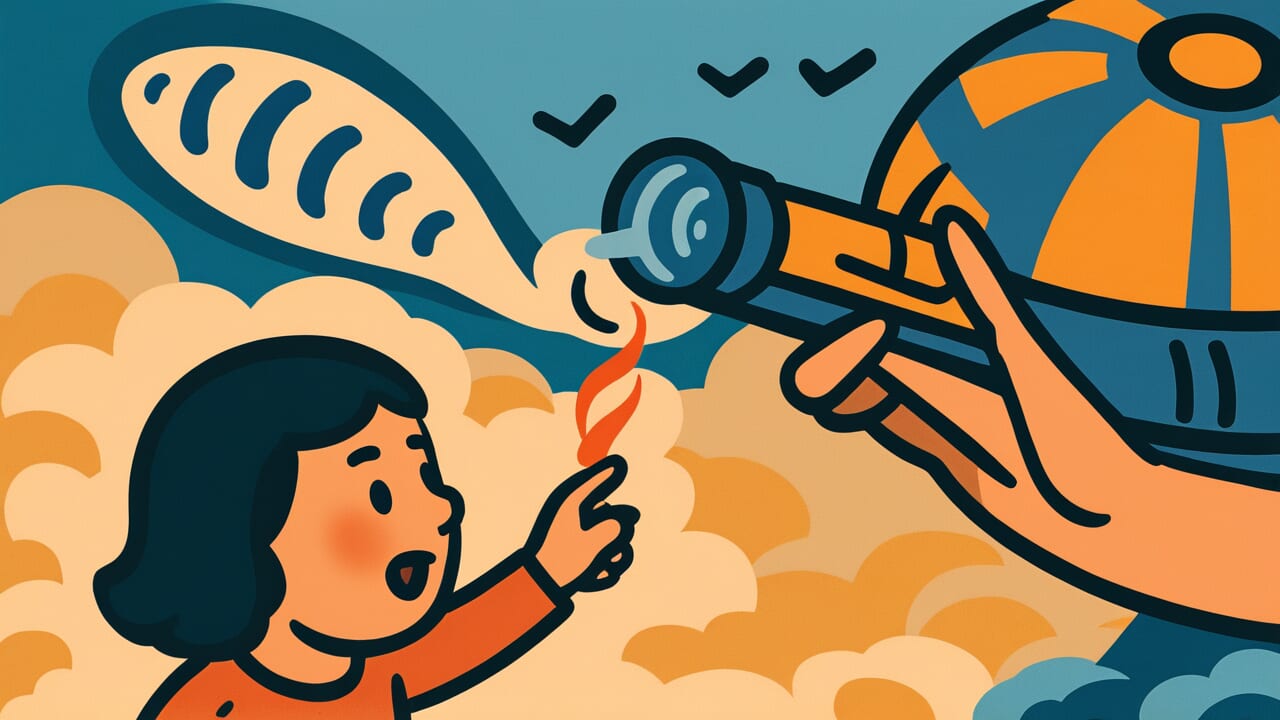How to Read “The hot fire is paid by the child”
Nekka, ko ni harau
Meaning of “The hot fire is paid by the child”
“The hot fire is paid by the child” describes an extremely cowardly act of self-preservation. It refers to pushing danger or misfortune onto others, even onto one’s own children, to protect oneself.
Parents should protect their children, even at the cost of their own lives. But this proverb depicts the complete opposite.
It shows someone willing to sacrifice even their own child, the person they should protect most, just to save themselves. This expression sharply criticizes such ugly human behavior.
People use this proverb to condemn cowardly acts of shifting responsibility to others. It criticizes unfair behavior that pushes burdens onto those in weaker positions.
Even today, this saying applies when company executives blame subordinates for scandals. It fits when parents make their children clean up their own mistakes.
This is a weighty expression that points out the most shameful human behavior.
Origin and Etymology
No clear written records explain the origin of this proverb. However, we can make interesting observations from how the phrase is constructed.
“Hot fire” literally means burning flames. It symbolizes danger or disaster falling upon someone.
“Paid” means to push away or transfer. The most shocking part is “by the child.”
The structure shows someone pushing their own disaster onto their child, the person they should protect most. This represents the ultimate act of self-preservation.
Japanese culture has always valued the bond between parent and child. That’s precisely why this proverb, showing the opposite, carries such powerful criticism.
This expression likely emerged because such behavior actually existed in society. Our ancestors keenly observed human weakness and ugliness.
In times of hardship and crisis, some people tried to survive by sacrificing those they should protect.
The structure of the phrase itself concisely expresses humanity’s most shameful behavior. It has been passed down through generations as a warning.
Usage Examples
- When the company’s fraud was exposed, that CEO made young employees take all responsibility, truly paying the hot fire by the child
- Pushing your mistake onto a newcomer and pretending nothing happened—this is exactly what “the hot fire is paid by the child” means
Universal Wisdom
“The hot fire is paid by the child” reflects the deep conflict between human survival instinct and moral conscience.
Everyone has an instinct to protect themselves when facing danger. But human society also has ethics and morals we must uphold.
The principle that parents protect children is a universal value shared across almost all cultures.
This proverb has been passed down through generations because such betrayals of universal values have existed in every era.
When cornered, humans sometimes make unimaginable choices. For self-preservation, they may sacrifice even those they should protect.
Our ancestors sharply perceived this ugliness.
What’s interesting is that this proverb goes beyond mere criticism. It contains deep insight into human weakness.
People are not perfect. In extreme situations, they may lose reason and make despicable choices.
That’s why we must discipline our hearts daily. We need to stay aware of the lines we must never cross, no matter the situation.
By illuminating the dark side of humanity, this proverb paradoxically asks us how we should live as human beings.
When AI Hears This
The second law of thermodynamics states that “entropy always increases.” Orderly energy naturally disperses into disorder, and this flow never reverses.
Hot coffee cools down, but cold coffee never naturally heats up. The act of “paying the hot fire by the child” in this proverb also has this one-way directionality.
What’s fascinating is that the flow of love and effort from parent to child has the same irreversibility as physical heat transfer.
Parents pour their energy into their children. But children don’t return it to their parents—they pass it forward to the next generation.
This has the same structure as heat flowing one-way from high to low temperature. If children tried to return the same amount to parents, it would be like “transferring heat from a cold object to a hot object”—thermodynamically unnatural.
Even more noteworthy is that this one-way flow maximizes overall energy efficiency. If each generation tried to repay the previous one, energy would be consumed in circulation.
Investment in new generations would decrease. But by flowing forward continuously, humanity’s energy as a whole is transmitted most efficiently to the future.
The laws of the universe have actually been teaching us the most rational form of love.
Lessons for Today
This proverb teaches us that difficult situations reveal a person’s true character.
In modern society, structures that push responsibility downward exist everywhere. Bosses blame subordinates for project failures.
Executives make frontline workers take responsibility for scandals. These are modern versions of “paying the hot fire by the child.”
What matters is how we act when placed in such positions. When facing difficulties, the temptation to shift responsibility to weaker people is always there.
Whether we can resist that temptation determines our character as human beings.
Also, when we’re in weak positions ourselves, we don’t need to accept unreasonable blame-shifting. Having the courage to speak up is important too.
This proverb shows us a line we must never cross as human beings. No matter how cornered we are, we must not sacrifice those we should protect.
This teaching remains a guiding principle for those of us living today.



Comments